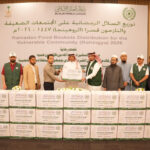A H M Masum Billah: The Halda River is a remarkable natural fish breeding center located in the south-eastern hilly region of the country, specifically in the Khagrachari and Chittagong districts. The river is a wonder of nature where various species of fish like Rui, Katla, Mrigel, and Kaliboush have been spawning since time immemorial. The river is also unique in that it is the only tidal river in the world where fertilized eggs of Rui-like fish are collected directly. Carp-like species spawn from April to June, which does not occur in other rivers of the country.
The Halda River originates from the Batnatali hills of the Khagrachari district and flows through several upazilas, including Manikchari, Fatikchari, Hathazari, and Raujan, before finally merging with the Karnaphuli river near Kalurghat. The river possesses unique physical and biochemical characteristics that make it an ideal location for fish spawning. These characteristics include upstream sediments enriched with nutrients from mountain springs, the meandering and depth of the river, moderate temperature, strong currents, turbidity, tidal activities, and heavy rainfall with thunderstorms occurring at a particular time or date.
The river water is rich in macro- and micro-nutrients for fish, which helps in necessary pre-reproductive growth. The growth rate of Rui fish in the Halda River is much higher than in other fish sources, making it a more profitable option for fish farmers and hatchery owners who cultivate or breed Rui fish in the river. However, despite being a natural fish breeding center, this river is currently facing numerous threats, such as encroachment, pollution, salinity, and the construction of rubber dams. Industrial waste pollution has caused a decline in the spawning rate of species like Rui, Katol, Mrigel, and Kaliboush, according to several reports.
Another significant threat to the river’s ecosystem is the unregulated hunting of brood fish, which is resulting in the depletion of the Halda parent fish population. To preserve such an important and traditional river, it is crucial to minimize all kinds of human interference and allow the river to flow naturally. Activities that alter the river’s physical characteristics, such as cutting bends, removing soil from the banks, extracting sand, and dredging, should be halted.
The government of Bangladesh took a crucial step on December 22, 2020, by declaring the Halda River, the only natural fish breeding center in South Asia, as Bangabandhu Fisheries Heritage. The declaration aims to protect the Rui fish species and Gangetic dolphin habitats by preserving the natural environment and enhancing environmental standards. As a result, no fish or aquatic animals can be caught in this river. However, during the breeding season every year, under the supervision of the Fisheries Department, fertilized fish eggs can be collected at certain times. Fishing in 17 canals connected to the Halda River has also been banned under the same declaration.
The government gazette specifies that 23,022 acres of land in the Halda River have been declared Bangabandhu Heritage, subject to 12 conditions for the Bangabandhu Fisheries Heritage Area. As a result, it will be possible to strengthen the safety system of the Halda River to prevent the killing of fish for illegal nets, stop engine-driven boats, stop sand mining, and protect biodiversity, including dolphins.
To enhance security measures and prevent illegal activities such as netting, sand lifting, and harming dolphins in the Halda River, closed circuit cameras (CC cameras) have been set up at eight different locations. The installation of these CCTV cameras will serve multiple purposes. The river can be monitored from remote locations even during the night, detecting any illegal activities taking place such as the installation of illegal nets, sand mining, or any harmful actions against dolphins. Additionally, the presence of these cameras will instill fear among individuals engaging in illegal activities, thereby deterring them from engaging in such actions.
In addition to these measures, it is essential to educate the local community about the significance of the Halda River and the impact of their actions on the ecosystem. Community-based initiatives such as awareness campaigns, community patrols, and eco-tourism can play a crucial role in safeguarding the river’s resources.
Furthermore, the Halda River’s unique characteristics and importance to the local economy make it an excellent location for research on sustainable fishing practices and river conservation. Universities and research centers should do research to learn about the river’s ecosystem and find ways to protect it that work.
The Halda River’s importance to the ecosystem and local economy cannot be overstated. The government’s recent declaration of the river as Bangabandhu Fisheries Heritage and the various measures taken to protect the river are welcome steps in the right direction. However, it is crucial to continue monitoring and enforcing these measures to ensure the river’s long-term sustainability. Through collaborative efforts, research, and community involvement, we can preserve this remarkable natural wonder for future generations.
Writer: Deputy Principal Information Officer at PID







